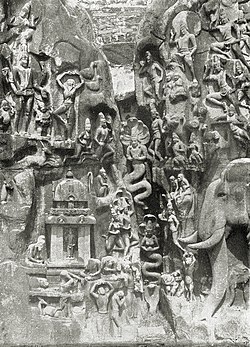List of Ikshvaku dynasty kings in Hinduism
Shraddhadeva Manu (Sanskrit manuśraddhādeva) is the current Manu and the progenitor of the current humanity (manvantara). He is the seventh of the fourteen Manus of the current kalpa (aeon).[1]
Shraddhadeva was the king of the Dravida Kingdom[2] before the Pralaya, the great flood. Forewarned about the flood by the matsya avatara of Vishnu, he saved humanity by building a boat that carried his family and the saptarishi to safety. He is the son of Vivasvana and is therefore also known as Vaivasvata Manu. He is also called Satyavrata (always truthful).
Ikshvaku (Sanskrit; ikṣvāku, from Sanskrit ikṣu; Pali: Okkāka), is one of the ten sons of Shraddhadeva Manu, Shraddhadeva was the king of the Dravida Kingdom before the Pralaya, the great flood.[3]
Suryavanshi kings[edit]

The genealogy of the Ikshvaku dynasty to Rama is mentioned in the Ramayana in two lists. The only difference between the two lists is that, Kukshi is mentioned only in the second list. In the first list, Vikukshi is mentioned as the son of Ikshavaku. The descendants of Vikukshi are known as Vikauwa. [4]
- Ikshvaku
- Kukshi/Vikukshi
- Kakutstha or Puranjaya
- Anena or Anaranya
- Prithu
- Vishvagashva
- Ardra or Chandra
- Yuvanashva I
- Shravast
- Vrihadashva
- Yuvanashva II
- Mandhatri
- Purukutsa I
- Kuvalashva (Dhundhumara)
- Dridhashva
- Pramod
- Haryashva I
- Nikumbh
- Santashva
- Krishasva
- Prasenjit
- Trasadasyu
- Sambhoot
- Anaranya II
- Trashdashva
- Haryashva II
- Vasuman
- Tridhanva
- Tryyaruna
- Satyavrata or Trishanku
- Harishchandra
- Rohitashva
- Harita
- Chenchu
- Vijay
- Rusak
- Vrika
- Bahu or Asit
- Sagara
- Asmanjasa or Asamanja
- Anshuman
- Dileepa I
- Bhagiratha
- Shrut
- Nabhag
- Ambarisha
- Sindhu Dweep
- Pratayu
- Shrutuparna
- Sarvakama
- Sudaas
- Mitrasah
- Sarvakama II
- Ananaranya III
- Nighna
- Animitra (brother of Raghu)
- Duliduh
- Dileepa II
- Raghu
- Aja
- Dasaratha
- Rama
Suryavanshi kings after Rama[edit]
The Puranas provide a genealogical list from Kusha to Brihadbala, who was killed by Abhimanyu in the Mahabharata war. This list is corroborated by the Raghuvamsha till Agnivarna:[5]
- Kusha (contemporary of Chandravanshi King Kunti)
- Atithi (contemporary of Chandravanshi King Turvasu -2)
- Nishadha (founded Nishadha Kingdom)
- Nala II
- Nabhas
- Pundarika
- Ksemadhanva
- Devanika
- Ahinagu
- Ruru
- Pariyatra
- Sala
- Dala
- Bala[disambiguation needed]
- Uktha
- Sahasrasva
- Para II
- Chandravaloka
- Rudraksh
- Chandragiri
- Bhanuchandra
- Srutayu
- Uluka
- Unnabha
- Vajranabha
- Sankhana
- Vyusitasva
- Visvasaha
- Hiranyanabha Kausalya
- Para III (Atnara)
- Brahmistha
- Putra
- Pusya
- Arthasidhi
- Dhruvasandhi
- Sudarsana
- Agnivarna
- Sighraga
- Maru
- Parsusruta
- Susandhi
- Amarsana
- Mahasvana
- Sahasvana
- Visrutvana
- Visvabhava
- Visvasahva
- Nagnajit
- Taksaka
- Brihadbala
Suryavanshi kings after Mahabharata[edit]
The Puranas also provide the list of the kings from Brihadbala to the last ruler Sumitra. But these lists mention Shakya as an individual, and incorporate the names of Shakya, Shuddodhana, Siddhartha (Gautama Buddha) and Rahula between Sanjaya and Prasenajit. The names of the kings are:[6]
- Brihatkshaya (or Bruhadrunam)
- Urukriya (or Gurukshep)
- Vatsavyuha
- Prativyoma
- Bhaanu
- Divakara (or Divak)
- Veer Sahadeva
- Brihadashva-2
- Bhanuratha (or Bhanumaan)
- Pratitashva
- Supratika
- Marudeva
- Sunakshatra
- Pushkara (or Kinnara)
- Antariksha
- Suvarna (or Sutapaa)
- Sumitra (or Amitrajit)
- Bruhadaraaj (Okkaka)
rudraksh
- Kritanjaya (Sivisamjaya)
- Ranajjaya (Sihassara)
- Sanjaya (Mahakoshala or Jayasena)
- Shakya (Sihahanu)
- Śuddhodana (ruler of Shakya Republic of Kapilavastu)
- Siddhartha Shakya (or Gautama Buddha, son of Śuddhodana)
- Rāhula (only son of Gautam Buddha)
- Prasenajit (born when Siddhartha age 27)
- Kshudraka (or Kuntala)
- Ranaka (or Kulaka)
- Suratha
- Sumitra
King Sumitra was Last ruler Suryavansha, who was defeated by the powerful emperor Mahapadma Nanda of Magadha in 362 BCE. However, he wasn't killed, and fled to Rohtas, located in present-day Bihar.[7]
References[edit]
- ↑ V. R. Ramachandra Dikshitar (1935). The Matsya Purana: A Study. University of Madras. p. 5.
- ↑ Rhonda Burnette-Bletsch, Jon Morgan (ed.). Noah as Antihero: Darren Aronofsky’s Cinematic Deluge. Taylor & Francis, 2017. p. 45.
- ↑ The Hare Krsnas - The Manus - Manus of the Present Universe
- ↑ Vyas, R.T. (ed.) (1992). Vālmīki Rāmāyaṇa, Text as Constituted in its Critical Edition. Vadodara: Oriental Institute, Vadodara. pp. 91–92, 255–56.
{{cite book}}:|author=has generic name (help) - ↑ History Of Ancient India ISBN 81-269-0616-2 vol II [1]
- ↑ Misra, V.S. (2007). Ancient Indian Dynasties, Mumbai: Bharatiya Vidya Bhavan, ISBN 81-7276-413-8, pp.283-8, 384
- ↑ The Valmiki Ramayana, Volume 3.
- Sources